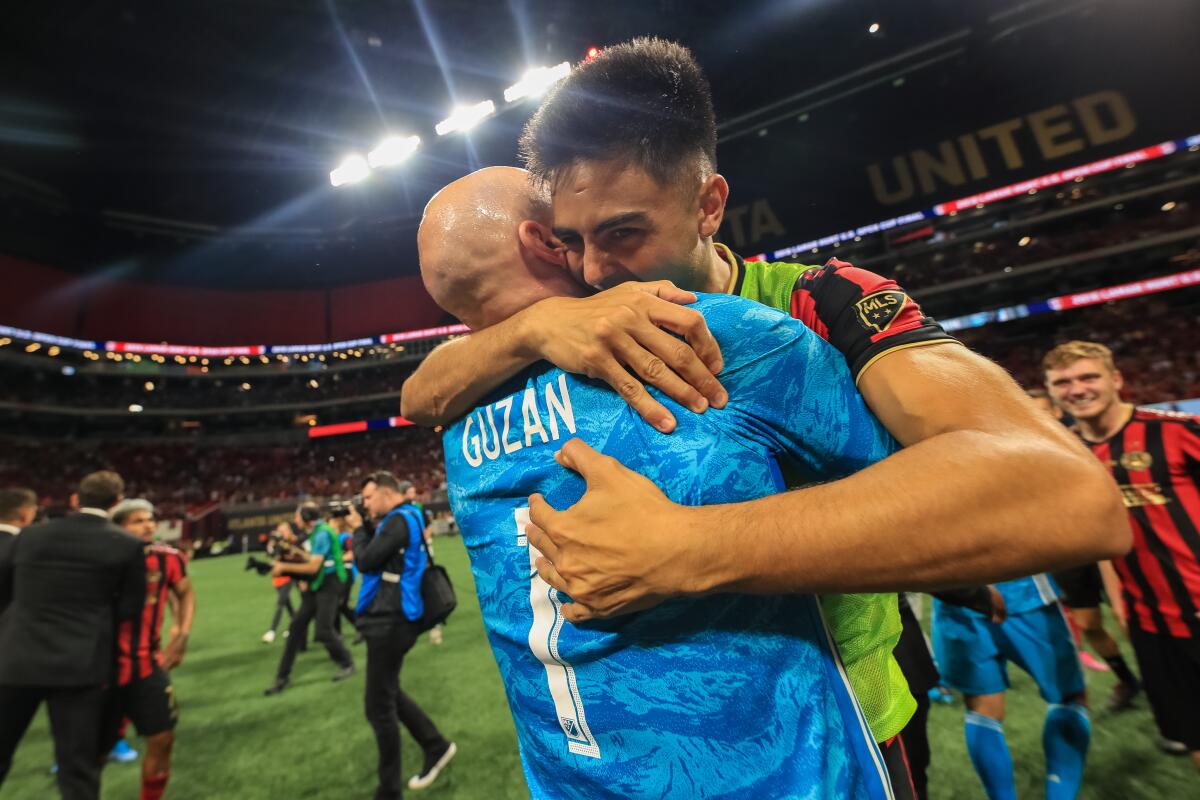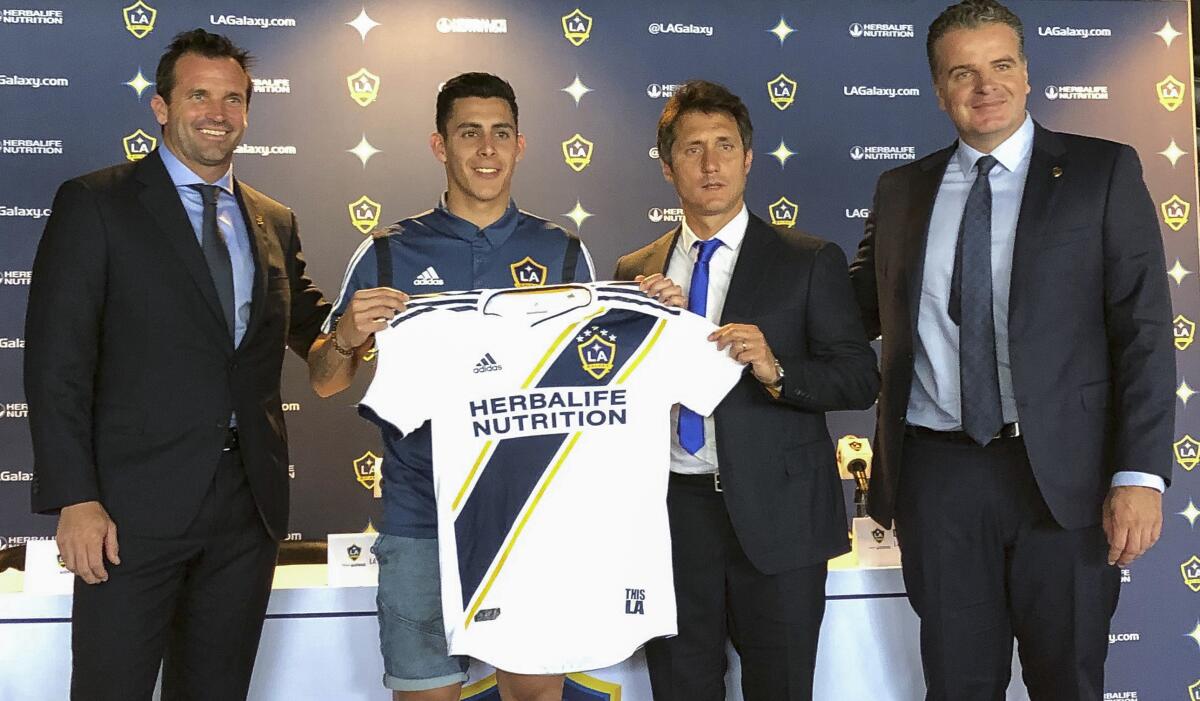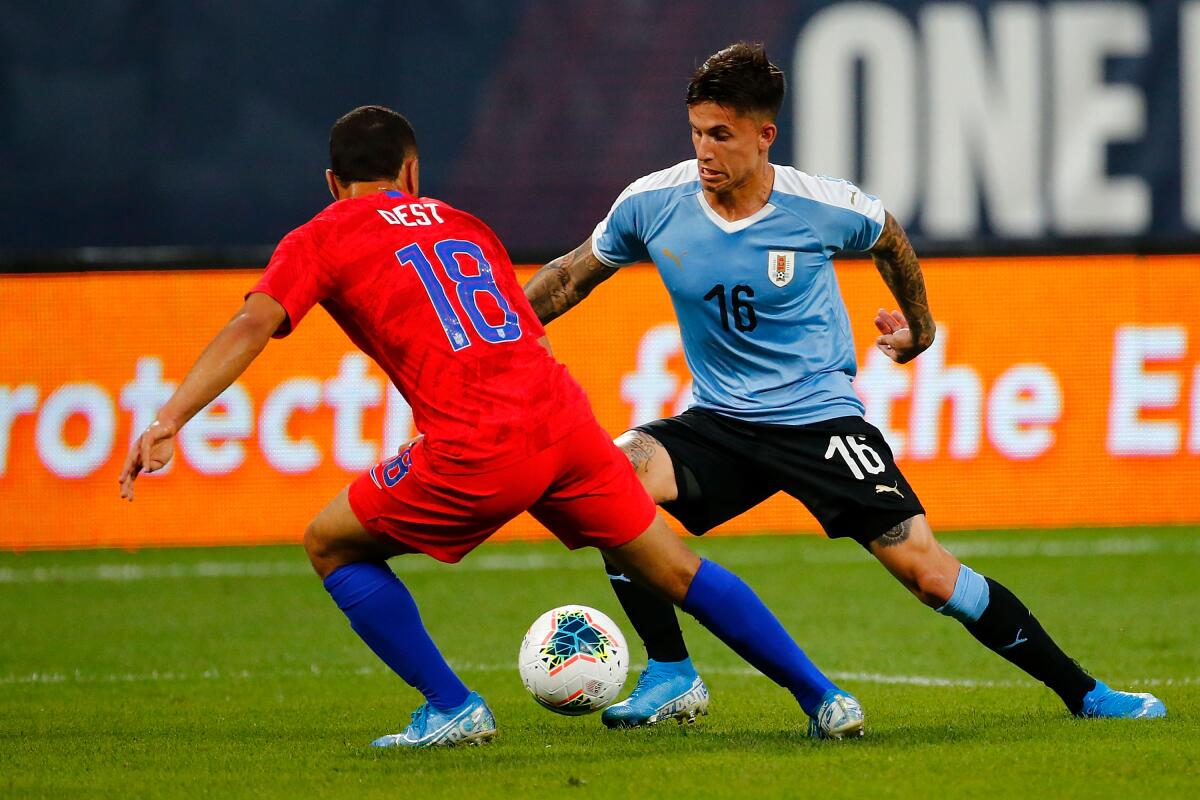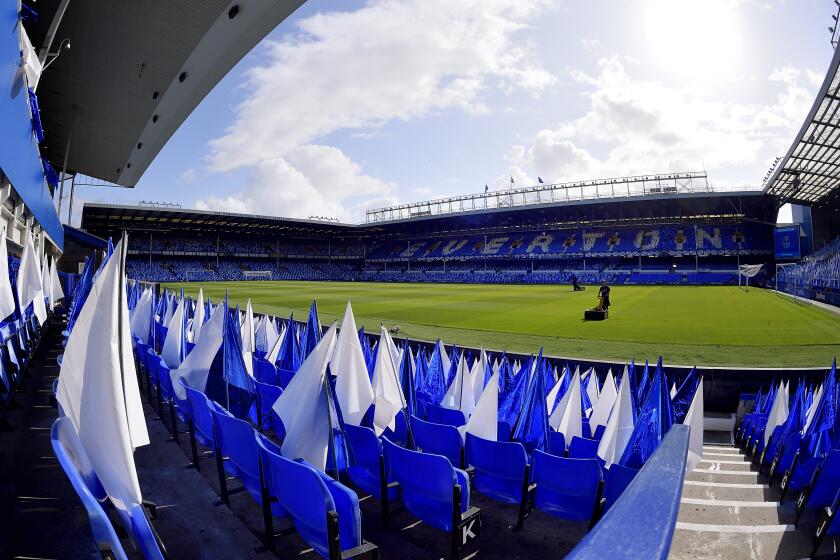MLS teams go extra mile to help players get acclimated to new surroundings

- Share via
Manny Tejeda should go into the wedding planning business.
As the team administrator for Atlanta United, the reigning MLS champion, a big part of Tejeda’s job is resettling players and their families in Georgia. That means filling out a lot of immigration paperwork and the U.S. government seems to like marriage a lot more than soccer players do.
“I don’t know if you’d call it an issue,” Tejeda said “but we have guys who have been with their spouses for a long time but they’re not legally married.”
In many countries that’s not a problem but it is in the U.S, where a player can get a work permit but his partner can’t stay here longer than six months. So when Tejeda was helping midfielder Pity Martinez, his longtime girlfriend Priscila Ventura and the couple’s daughter relocate from Argentina, where domestic partnerships are recognized, he shared a warning.
“If you don’t get married, this issue is not going to go away’” he told the player.
So Martinez flew home on a weekend, got married and came back.
On another occasion the partner of a foreign-born coach had little trouble with her immigration status but she didn’t qualify for medical benefits without a marriage license. So after training camp the coach flew home, got married and returned to Atlanta.
He has a hat trick in a 7-2 victory and says “I am the best ever to play in MLS. And that’s without joking.”
“It’s a lot more common than you think,” said Tejeda, a Santa Ana native. ”I’m responsible for at least six marriages on this squad. To be fair they genuinely have been with these girls for a long time and they just never got married.”
It’s all part of the job for MLS team administrators, who have the difficult and thankless task of getting players, their families and sometimes their pets set up in the U.S. once those players have signed from abroad.
“You have to perform magic in some senses,” LAFC’s Geoff Huber said. “You try to control the controllable and predict the unpredictable.”
It’s a complex assignment that includes everything from securing visas and international transfer certificates to helping the player find a place a live, turning on the utilities and negotiating traffic. And it must be done quickly since those new acquisitions — many of whom were expensive acquisitions — can’t play until it’s all finished.
“There needs to be some patience and there needs to be some time to get everything done. Because you can’t force things in the United States. And you shouldn’t,” said Galaxy general manager Dennis te Kloese.
Few teams know that better than the Galaxy, who have imported six starters and an entire coaching staff since January, just weeks after the team moved Te Kloese and his family from Mexico. Without those additions, the team probably wouldn’t be fighting for a playoff berth Saturday when it meets the Montreal Impact at Dignity Health Sports Park.
Some of those moves were easier than others. Uruguayan defender Diego Polenta, who has an Italian passport, was able to enter the U.S. legally and stay for 90 days but had to go to Vancouver and wait for an appointment at the U.S. consultant to get a visa. Argentine midfielder Cristian Pavon, on the other hand, played in his first game three days after agreeing to a contract.

“They want them on the field immediately. My job is to make sure they’re on the field immediately,” said Zack Murshedi, in his sixth season with the Galaxy, making him one of the longest-tenured team administrators in MLS.
Sometimes the immigration paperwork can be the easiest part of the process, especially since many teams have their administrators begin work on that long before a contract is signed. But Huber faced a series of additional challenges last month when the team signed two young Latin Americans, 18-year-old Uruguayan winger Brian Rodriguez and 20-year-old Ecuadoran defender Diego Palacios, who could both play Saturday when LAFC hosts Toronto FC with a chance to secure home-field advantage throughout the playoffs.
Rodriguez, who had never lived outside Uruguay, came to Los Angeles with only his girlfriend while Palacios came alone, factors that can make the transition more difficult and the homesickness more acute — especially since neither player speaks English.
“Once they’re here in market, that’s just the beginning,” Huber said.
“I want them to assimilate themselves here in Los Angeles. But at the same time it takes some hand-holding. There is a lot to changing cultures and moving, whether or not it’s in the United States.”
Palacios traded a crowded house and a large family in Ecuador for a small, empty apartment a few miles from LAFC’s training facility.
“I spend most of my time with PlayStation,” he said in Spanish. “I sleep. I rest as much as I can.”
He doesn’t have a car or a driver’s license so he hitches rides with teammate Eduard Atuesta, who lives in the same apartment complex. The team, including Huber, “has been spectacular,” he said. “They know when you’re coming from abroad you don’t have anyone here and they treat you like family.”
John Thorrington, LAFC’s general manager, learned the importance of that from experience. After his junior year in high school on the Palos Verdes Peninsula, he signed with England’s Manchester United, beginning a European journey on which he played for five teams in two countries before his 25th birthday.
He later played for three MLS teams in the U.S. and Canada.
“I did it as a young single guy, I did it as a married guy. I did it as a guy married without kids, I did it as a guy married with kids,” Thorrington said of moving. The most challenging transition, he said, came just before the 2011 season when he went from Chicago to Vancouver while his wife Krista was seven months pregnant.
If Prime Minister Boris Johnson makes good on his pledge to get Britain out of the European Union next month, it could have dire soccer consequences.
“New country, new medical system, new insurance, everything,” he remembered.
That has influenced how LAFC handles new players.
“You try to make sure the transition is for not just the player but for the whole family,” he said. “You have to deal with schools for your kids. Maybe a job transition for your wife. It is a lot.
As a result Huber, team coordinator Mitchell Monihan or another staff member accompany players to medical appointments, to the DMV and often on house-hunting trips as well. LAFC is also offering language classes, for players and staff, to help bridge the gap more quickly.
“A lot of my job is crisis management,” Huber said. “If you can think one, two, three steps ahead of what could potentially happen, the better.”
All that was new for he and Monihan in the winter of 2018 when Thorrington began putting together the expansion team’s first roster, with many of the signings coming just days before training camp opened.

“It was like drinking through a fire hose,” said Huber, a former professional player who came to LAFC as an account executive and had no experience as a team administrator. “There were a lot of sleepless nights. [Mitchell] and I were just thrown into the fire.”
So they set up shop at a Starbucks in Eagle Rock, logged onto to the free WiFi and began calling players, agents and immigration lawyers.
“There will never be a more difficult time,” said Huber, who had to bring in players and coaches from a dozen countries. “And I’m proud to say not one single player got here in market late.
“If there’s nothing in the headlines of XYZ player being delayed here and there, I’ve done my job.”
The community of team administrators in MLS is small and unusually supportive, sharing advice and brainstorm solutions through a chat group organized by Tejeda, who once had a player try to expense the cost of relocating his dog from England.
Told that only applied to family members, the player argued “your dog is your family.”
He lost.
“It’s insane,” said Murshedi, whose Galaxy staff includes soccer operations director Gordon Kljestan and team vice-president Karen Goodheart. “People really don’t think about that stuff when they’re watching the games; how much went into getting them into that game.”
More to Read
Go beyond the scoreboard
Get the latest on L.A.'s teams in the daily Sports Report newsletter.
You may occasionally receive promotional content from the Los Angeles Times.








